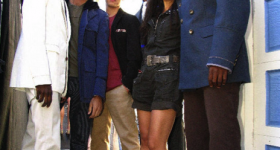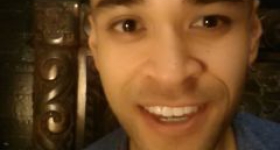By Annabelle A. Udo-O’Malley (additional reporting by Gloria Kim)
Deep down, Terry Park was determined to become Mr. Hyphen 2011. From submitting a video of himself singing the Spice Girls hit “Wannabe” to choreographing his performance as an air guitarwielding unicorn rebelling against his iron-pawed Tiger Mom — Park brought his A-game to the sixth annual competition in San Francisco last November.
“I thought I was too old to run even though there isn’t an age limit,” an exuberant Park said. “I’m 32, which, in unicorn age, is about 2,000 years old.”
With Park’s acting background, it’s no surprise he’s so comfortable onstage. He once toured with a Shakespearean theater company and had his own one-man, off-Broadway show in New York, “38th Parallels,” an autobiographical performance about his Korean American identity.
Park took the crowd by storm in the sleepwear portion of the contest, typically a time when contestants demonstrate their sexy or sensitive sides. Park, by contrast, rattled a Shake Weight while dressed in pink fleece pajama bottoms and an oversize sun visor — a style he describes as a salute to the Korean ajumma, or middle-aged woman. “I wanted to pay tribute to them and how nonchalant and bad-ass they are for wearing weird stuff and not caring,” Park said.
Jokes and whimsy aside, the unicorn in his opening skit was actually symbolic of Park’s racial identity as a Korean American growing up in Salt Lake City. “I didn’t like what I saw in the mirror,” Park said. “It was very difficult to formulate an Asian American identity in an environment that doesn’t recognize Asian Americans, somewhat in a way that people don’t recognize unicorns.” But a defining moment for Park was watching the 1992 L.A. riots unfold on the news. It transformed the way he saw himself. “My family owned a candy store in suburban Salt Lake City,” Park said. “Just seeing Korean stores being burned in L.A. and seeing Korean American faces on the TV screen for the first time made me, in such a strange way, able to identify as Korean American.”
It inspired him to pursue his doctorate in cultural studies at the University of California, Davis. He has since taught courses in Asian American history, media and theater at Hunter College in New York as well as at San Quentin State Prison.
The $1,000 prize from Park’s victory went to the Asian Prisoner Support Committee (APSC), a San Francisco Bay Area-based organization that supports Asian and Pacific Islander prisoners and raises awareness about the growing number of Asians and Pacific Islanders in the US being imprisoned, detained and deported.
Through the Prison University Project, Park taught Asian American theater to a small group of inmates in San Quentin. Park’s class also incorporated a creative writing workshop, where the student inmates read plays by Asian American playwrights and also wrote about their personal experiences in prison. One piece that particularly struck him was a Macbeth-esque poem about a man lying in bed who suddenly finds himself in prison and sees an apparition of the person he murdered.
“Their experiences filter into their works, which can be very intense, but they are the best students I’ve ever had,” Park said. “There have been times when a student is saying, ’Hey, have you read Dostoevsky yet?” and someone will respond, ’No, man, I’m still working on Bronte.’ ”
Park emphasized that the University Project is a crucial component of the prison system, and that students are genuinely trying to transform themselves. According to Park, San Quentin is the only prison facility in California to have this program, and inmates in California often want to get transferred there, regardless of its notorious reputation. Though it is California’s only death row facility and has housed its share of infamous inmates, Park believes that San Quentin’s inmates are the best behaved in California. “It has hundreds of unique programs and inmate-led organizations,” he said.
“It has been a very transformative journey for me,” Park said. “With Mr. Hyphen, the performance came together — these three loves and passions of mine converged on that stage. It made me see that I can be an academic, an activist and an actor, and the money for APSC will be useful for raising awareness for an organization that really deserves it.”









Comments